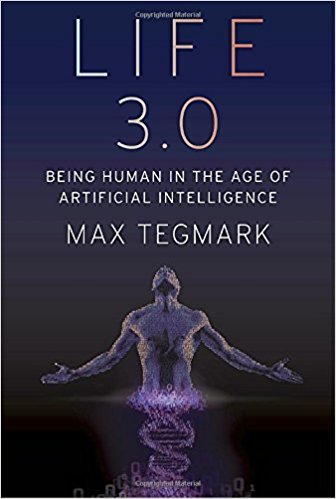Last summer my husband took me and our kids to a presentation on Deep Learning and Neural Networks. He thought it would be fun for us. Yep, that’s what he said. Needless to say, 90% of the presentation was over our heads, although the boys did get a good hour of play time on my iphone, so I guess that was a little fun for them.
But, now that I’ve read Max Tegmark’s Life 3.0: Being Human in the Age of Artificial Intelligence, I actually understand what the scientists were presenting. And it’s truly fascinating.

Tegmark begins the book with a brief overview of the current state of AI, which is relatively narrow, limited to playing chess or driving cars, but he soon makes the argument that broader, human level AI is possible and probable. Neural networks learn by re-arranging themselves to get better at tasks, and they are improving quickly. That means soon we may have robo-judges or AI generated films or, more frightening, intelligent weapons. We may even be able to copy our mind into a neural network enabling a whole new virtual era of living. Imagine every Black Mirror episode you’ve ever seen becoming reality. If that scares you, read on, because Tegmark’s main purpose in writing is to urge us to plan for an AI enabled utopia, rather than the dystopias we commonly find on TV. So in addition to making sure AI systems are free of bugs and bad assumptions, that they can’t be hacked and that humans can intervene as needed we also need to prepare for an overhaul of our society. How do we fairly distribute resources in a low employment society? Who has control over setting the AI’s goals and how do we ensure the AI retains the goals we have set? If we can colonize the universe by transferring our consciousness to machines, should we bother with organic bodies? Would such machines truly be conscious or would they simply be zombies acting as if they were conscious? He explores many possible futures for human beings and asks us to consider if they are desireable. Tegmark leans towards the belief that human-level AI and possibly super-intelligent AI will be part of our futures, but maintains that we have the power to influence how it gets implemented.
After several clear and thought-provoking chapters about the near-ish future of AI, Tegmark jumps forward millions of years into the future to explore the limits of AI and of life itself and this is where I felt he gets a bit off course. As a physicist he analyzes everything in terms of physics. There are lengthy discussions about the total number of particles in the universe and how many of them could be devoted to creating a super-intelligent AI. He goes into detail about Dyson Spheres and the possibility of using black holes to power a galaxy wide system. These tangents did not add much to his argument and frankly, I found them them hard to follow.
In the final chapter, he circles back to the idea of consciousness, which he defines broadly as “having subjective experiences.” He eloquently makes the case that consciousness is what ultimately gives meaning to our universe. Without us to add beauty and love and life, it’s all just particles obeying the laws of physics. So, how do we know what lifeforms are conscious? And where exactly does consciousness reside? These are tricky questions and Tegmark’s greatest fear seems to be not that humans are replaced by AI (he argues that AI could simply be seen as our descendents) but that in our efforts to expand our environment we replace ourselves with something that fails to truly experience our world. This, he argues, may be the ultimate zombie apocalypse.
So, what do you think? Have thought about how AI might change our lives? What do you think is likely to happen?
I think the changes will happen gradually, and we will not notice a significant change unless we reflect back on a few years back.
It started with personal computers and smartphone advancement. Today we don't really notice how these technology greatly affect us. In a similar way that's how AI will progress. At its peak, we didn't realize what was happening about decades ago up until the present.
Downvoting a post can decrease pending rewards and make it less visible. Common reasons:
Submit